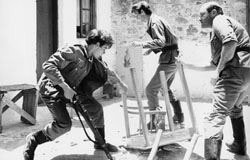
Signs of Life
(Lebenszeichen)
Pho: Thomas Mauch
Ed: Beate Mainka-Jellinghaus
Prod Mgr: Nicos Triandafyllidis
Prod Co: Werner Herzog Filmproduktion
Cast: Peter Brogle, Wolfgang Reichmann, Athina Zacharopoulou
Germany / 1968 / B&W / DCP / German / Eng Subtitles / 87min
It is only the characters in his films that have impossible dreams. By the time he was 18 years old, Werner Herzog knew he would be a professional filmmaker. Munich Film School enabled him to fulfil his passion, but not through any filmmaking course, Herzog stole a 35mm camera! Six years later his first feature film Signs of Life won the Silver Bear at the Berlin Film Festival and established the recurrent themes and imagery that have become familiar in his work over the last 48 years in such modern classics as Aguirre , the Wrath of God (1972) and The Enigma of Kasper Hauser (1974). Three bored German soldiers guard an isolated island outpost in occupied Greece towards the end of World War II (Herzog's archaeologist grandfather had lived and worked for several years in the same location). Boredom is allayed by inventing a device for trapping cockroaches or deciphering Greek texts from stones in the fortress, but one of the men begins an increasingly disturbing descent into madness which goes from him shooting, Don Quixotelike, at windmills to threatening to blow up the entire town. Signs of Life can be seen as a satirical allegory on the absurdity of war at a time when the Vietnam conflict was at its bloodiest and worldwide protests became increasingly vociferous. In the context of the director's work, it is faithful to his obsessive commitment to filming "the truth", fact or fiction, and it would not be the last time that hypnotised chickens would feature in the films of Werner Herzog.
| Date | Time | Venue |
|---|---|---|
| 3/7/2016 (Sun) # | 2:00pm | Cinema, Hong Kong Film Archive |
# Post-screening talk with Long Tin
The contents of the programme do not represent the views of the presenter. The presenter reserves the right to change the programme should unavoidable circumstances make it necessary.

